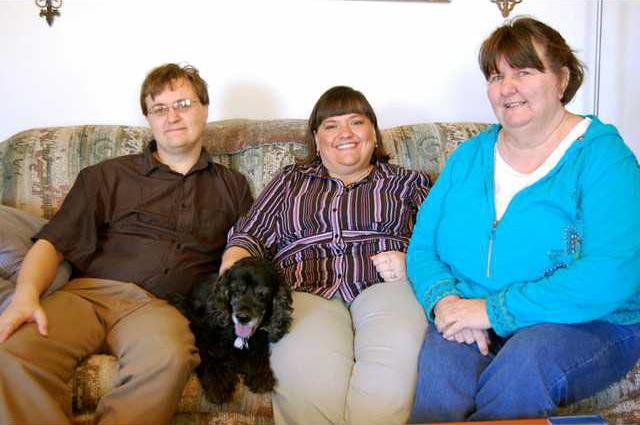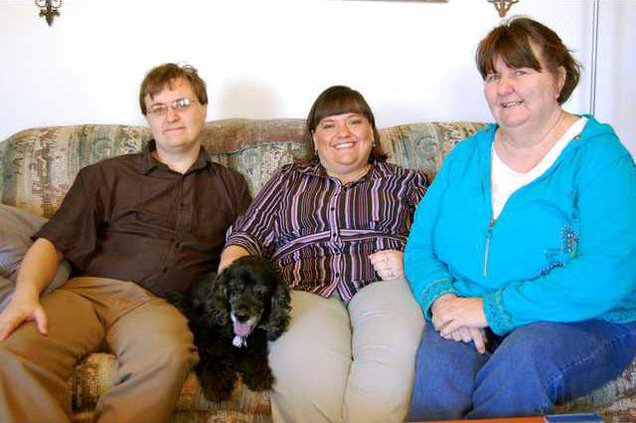Cassidy, a small, three-legged dog,belonged to a caring, elderly man. But when the man became terminally ill and entered hospice, Cassidy’s fate was in jeopardy. This uncertainty weighed heavily on the owner.
Sharon Wetz, a volunteer at Hospice of Midland in Texas, helped the man find rest through Pet Peace of Mind, an organization that cares for pets or finds foster homes for them while the animals’ owners are in hospice.
“The patient wasn’t doing real well,” Wetz said. “He was just more worried about the dog than himself.”
Wetz thought it would be a good idea for her son Matt and his wife, Alison, to adopt Cassidy, offering the man some comfort and giving the dog a new home.
“We were just glad to help him have a peaceful time as he was so sick,” Alison said.
Hospice of Midland became an approved Pet Peace of Mind location in February 2010, according to Susie Mauldin, director of volunteer services there.
Mauldin said Pet Peace of Mind allows hospice volunteers to help their patients in a more organized, efficient manner. She said the program relieves stress for patients and families.
“It’s because of Pet Peace of Mind and the realization of our staff that we have a way of helping,” Mauldin said. “The organization Pet Peace of Mind and the approach to it [are] really raising our awareness of how to help these patients and their families.”
Wetz knows how important it is for patients to know their pets will have a home.
“You really want that dog or animal to have a place to go,” Wetz said. “I’m sure the gentleman is at peace. I have a feeling he knows the dog is in a good home.”
‘A tool to help patients and families’
Pet Peace of Mind began in 2007 and now has 33 locations in 21 states. Hospice of Midland was the first hospice-care center in Texas to develop a Pet Peace of Mind program. Mauldin believes it would be beneficial for others to join the organization.
“I just think it is phenomenal to give us a tool to help patients and families in so many ways,” she said.
“These volunteers are saving the lives of these animals,” Mauldin added. “About the only other choice for them is to be taken to Animal Control, and there [are] only so many days they get and then they’re euthanized.”
Like Cassidy’s first owner, for Lila Crutchfield, her dogs weren’t just something to keep her entertained. They were her family.
“My mother spoiled those dogs,” said Jan Ward, Crutchfield’s daughter. “She was their mom. They were literally her life.”
When Crutchfield was diagnosed with terminal cancer and had to enter hospice, Ward wasn’t sure she would be able to give special care to her mother’s beloved dogs while also acting as primary caregiver for her mother.
“They were considering finding the pets another home. I think that would have been devastating for her,” said the Rev. Delana Taylor McNac, program manager for Pet Peace of Mind.
Thankfully, for Ward and Crutchfield, Pet Peace of Mind stepped in to help. Each day, the organization brought the dogs from a nearby town to visit their devoted owner.
“They were there the day before she passed away,” Ward said. “They were so comforting to her. She knew her dogs were taken care of, and she really appreciated that. I could not have done what I did for my mother — provided the level of care — if I would not have had them and the Pet Peace of Mind program involved in helping take care of her dogs.”
Changing the face of hospice care
McNac, a deacon at Haikey Chapel Indian United Methodist Church in Tulsa, Okla., said pets are not only important for those in hospice care. They also play an important role in the lives of children who reside with terminally ill relatives.
Donna Wilcox, a single mom of 8-year-old Brady, acts as the primary caregiver for her father. Brady’s cat Lucas has been a source of help as he copes with his grandpa’s illness.
Wilcox said when Lucas needed to be neutered, she was concerned because she knew the procedure was important but also expensive.
“Pet Peace of Mind … offered to have the cat neutered and up-to-date on his vaccinations so that they would be assured he was healthy,” McNac said.
“It’s been a huge burden lifted throughout this time,” Wilcox said.
“It would just be really hard to live without him,” Brady said of his feline friend.
Patients view pets as a part of their family, so hospice care should do the same, McNac said.
“What we’re trying to do with this program is change the face of hospice care to include pets as family members,” McNac said.
“Hospice patients unfortunately find themselves having to deal with everybody else’s reaction to their illness,” McNac said. “People come to visit them who are actively grieving, and the patient is put into a position where they have to be the one to comfort people.
“So, to have someone in their lives who doesn’t respond to that, who treats them the same as they always have, who doesn’t care if they are having a good day or a bad day, is a very important spiritual and emotional resource for a dying patient.”
Snell is an intern at United Methodist News Service in Nashville. She graduated from Ellinwood High School in 2008 and is a senior in journalism and news media at Lipscomb University. She is the daughter of Rick and Jill Snell of Ellinwood.
Hospices meet peoples needs through pet care





